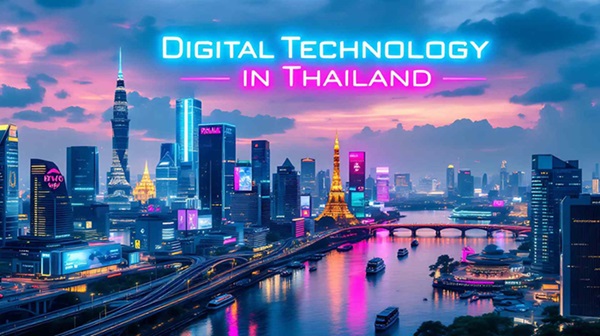Thailand is at the centre of a historic digital revolution. From artificial intelligence (AI) to 5G connectivity, from fintech adoption to smart city projects, digital technology in Thailand is no longer just a trend—it is a way of life.
The government’s Thailand 4.0 strategy is fuelling this rapid transformation, shifting the nation from a manufacturing-driven economy to one led by innovation, technology, and human capital. With strong collaboration between the public and private sectors, Thailand is positioning itself as a leading digital hub in Southeast Asia.
This article explores the major drivers of digital transformation in Thailand, its impact across industries, challenges ahead, and why the future looks brighter than ever.
Smart Cities – Building the Future of Urban Thailand
One of the most exciting aspects of Thailand’s digital journey is the development of smart cities. These cities aim to improve efficiency, liability, and sustainability by using technology for everyday challenges like traffic, pollution, energy management, and public safety.
Bangkok, Phuket, and Chiang Mai Leading the Way
- Bangkok: Implementing smart traffic management systems that reduce congestion with AI-powered sensors.
- Phuket: A pioneer in smart tourism and traffic monitoring, offering digital apps to guide tourists and manage public services.
- Chiang Mai: Using AI-driven agriculture and sustainable city planning to balance urbanization with local needs.
Benefits of Smart Cities
- Faster transportation through digital ticketing & route optimization.
- Reduced carbon footprint with green architecture and energy-efficient systems.
- Enhanced security through AI-powered surveillance and real-time monitoring.
These projects are more than technology upgrades—they are reshaping Thailand into a country where cities adapt to human needs rather than the other way around.
5G and the New Era of Connectivity
The rollout of 5G networks in Thailand is a game-changer. With higher internet speeds, lower latency, and larger network capacity, 5G is driving innovation across industries.
Impact of 5G in Thailand
- Healthcare: Telemedicine allows patients in rural areas to consult doctors in Bangkok hospitals through high-speed video calls.
- Education: Online classes and virtual learning are now smoother, making education more accessible nationwide.
- Manufacturing: Smart factories using IoT (Internet of Things) improve production efficiency.
- Transportation: Autonomous vehicles and connected traffic systems are becoming possible.
5G is not just about faster downloads—it is the backbone for future technologies like driverless cars, precision farming, and smart homes.
E-Commerce and Fintech Revolution
Thailand is witnessing an explosive growth in online shopping and digital payments. E-commerce has become part of daily life, with platforms like Lazada, Shopee, and JD Central dominating the market.
The Rise of Digital Payments
Consumers are moving away from cash and embracing mobile wallets and QR payments. Popular platforms include:
- Prompt Pay – a government-backed digital payment system with over 70 million registered accounts.
- True Money Wallet – widely used for bills, shopping, and peer-to-peer transfers.
- Rabbit Line Pay – popular for transport, food delivery, and retail.
Fintech Driving Financial Inclusion
- AI-driven banking: Chatbots for customer service, fraud detection, and personalized financial planning.
- Blockchain technology: Used for secure transactions and record-keeping.
- Microloans & e-payments: Helping small vendors and street businesses grow digitally.
Thailand’s fintech growth is not just convenient for urban citizens—it is empowering small vendors, farmers, and rural communities by making financial services more accessible.
Artificial Intelligence and Automation
Artificial intelligence (AI) and automation are transforming how Thai businesses operate.
AI Applications in Business
- Retail & Tourism: Predictive analytics and AI-driven recommendations improve customer experiences.
- Logistics: AI helps optimize delivery routes and supply chain management.
- Banking: AI chatbots provide faster, more efficient customer service.
Automation for Competitive Advantage
- Factories are adopting robotics for manufacturing and assembly lines. At the same time, outsourcing and digital workforce solutions like Timewarp TaskUs
- Hotels and airports use AI-powered check-ins and facial recognition.
- Healthcare providers employ AI for faster diagnosis through medical imaging.
By embracing AI, Thailand is boosting productivity, reducing costs, and enhancing global competitiveness.
Healthcare Transformation with Digital Technology
Healthcare in Thailand is becoming more efficient, accessible, and patient-friendly thanks to digital transformation.
Telemedicine and Remote Care
- Patients in rural villages can connect with Bangkok doctors via video consultations.
- Hospitals are reducing overcrowding with virtual appointments.
Wearables and Mobile Health
- Fitness trackers monitor blood pressure, heart rate, and activity in real time.
- Mobile health apps remind patients about medication and track wellness goals.
Digital healthcare is cutting waiting times, lowering costs, and improving outcomes—a huge win for Thailand’s healthcare system.
Education – The Backbone of Thailand’s Digital Economy
Education is one of the pillars of Thailand’s digital development.
Online Learning and Virtual Classrooms
- Thai MOOC and DLTV platforms provide free online courses across the country.
- Schools are integrating AI-based tutoring to support students in remote areas.
Preparing the Workforce for Thailand 4.0
- Digital skills like coding, machine learning, and data science are becoming part of the curriculum.
- Universities are partnering with tech companies to equip students for future jobs.
Education ensures that Thailand’s future workforce is ready for digital economy jobs, making it a sustainable revolution rather than a short-lived trend.
Cybersecurity – Protecting a Digital Nation
With rapid digitization comes the risk of cyber threats. Thailand has seen rising cases of phishing, data breaches, and ransomware attacks. Recent incidents like the TheJavasea.me leaks AIO-TLP.
Cybersecurity Measures in Thailand
- Businesses are investing in encryption software and secure cloud systems.
- Government agencies run public awareness campaigns to educate citizens.
- Companies are building multi-layered defence systems to protect sensitive data.
As Thailand becomes more connected, cybersecurity is not optional—it is the foundation of trust in the digital economy.
Cloud, Blockchain, and Smart Infrastructure
Thailand is also investing heavily in cloud computing and blockchain solutions.
Cloud Investments
- Tech giants like Google and AWS are setting up data centers in Thailand.
- Cloud storage is helping Thai businesses scale faster and reduce IT costs.
Blockchain Adoption
- Used in banking, supply chain management, and government record-keeping.
- Ensures transparency and reduces fraud.
Smart Infrastructure
- Smart energy grids for efficient power usage.
- Digital surveillance to improve urban security.
- IoT-powered transport for efficient mobility.
This infrastructure is laying the foundation for Thailand’s long-term digital growth.
Challenges in Thailand’s Digital Transformation
Despite impressive progress, Thailand faces hurdles in becoming a truly digital-first nation.
- Digital Divide: Rural areas still lack equal access to devices and internet literacy.
- Cybersecurity Risks: Rapid adoption creates vulnerabilities if not addressed.
- Policy Gaps: Laws and regulations sometimes lag behind technology.
- Privacy Concerns: With more data collected, citizens demand stronger data protection.
To succeed, Thailand must balance innovation with inclusion and security.
The Future of Thailand’s Digital Revolution
The future of digital technology in Thailand looks highly promising.
- Startups in fintech, AI, and robotics are attracting global investments.
- Government and private sector partnerships continue to fuel innovation.
- Citizens are becoming more digitally literate and connected.
With sustained investment in infrastructure, education, and cybersecurity, Thailand can achieve its Thailand 4.0 vision and emerge as a regional tech powerhouse.
Conclusion
Thailand’s digital transformation is not just about adopting the latest technologies—it is about creating a smarter, more inclusive, and future-ready nation.
From smart cities and fintech growth to AI in healthcare and education, digital technology is reshaping lives, businesses, and governance. While challenges like cybersecurity and digital literacy remain, the progress so far proves that Thailand is on the right track.
This revolution is more than a technological shift—it is a mindset shift, one that positions Thailand as a leader in Southeast Asia’s digital economy.
FAQs
Thailand 4.0 is a government initiative to transform the economy from manufacturing-led to innovation and technology-driven.
5G enables faster internet, telemedicine, IoT, smart factories, and connected vehicles.
PromptPay, TrueMoney Wallet, and Rabbit Line Pay are widely used for daily transactions.
AI is applied in retail, banking, healthcare, logistics, and even tourism for smarter services.
Rural-urban digital divide, cybersecurity risks, data privacy issues, and policy gaps.




